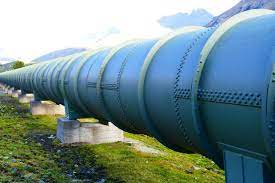Oil and gas pipelines are branching out, as more and more
countries rely on imports for their energy supplies. From the Keystone XL to
the Rockies Express, hydrocarbons-technology.com lists the longest pipelines in
the world.
The Yamal-Europe pipeline is a natural gas distribution system running
across Russia, Belarus, Poland and Germany. The 4,107km-long pipeline has a
diameter of 1,420mm and can carry 33 billion cubic metres a year.
Construction was carried out by dividing the length of the pipeline into
different sections. The 402km Russian segment starts from the Torzhok gas
transmission hub and receives gas from the Northern Tyumen Regions-Torzhok gas
pipeline.
The 575km Belarusian section runs across Belarus and includes five
compression stations at at Nesvizhskaya, Krupskaya, Slonimskaya, Minskaya and
Orshanskaya.
The Polish pipeline measures 683km-long and passes through 32 railway lines,
246 roads, 108 surface water streams and seven large rivers.
The German section is connected to the YAGAL-Nord gas transmission system
which is in turn connected to the STEGAL-MIDAL-Rehden UGS gas transmission
system.
The Eastern Siberia-Pacific Ocean oil pipeline (ESPO) exports crude oil from Russia to the Asian Pacific markets of Japan, China and
Korea over a length of 4,700km.
The original project proposed to build a pipeline from Angarsk, Russia to
Daqing in northern China. This was then combined with a pipeline project from
Taishet in Irkutsk Oblast to the Far East port of Kozmino near Nakhodka in May
2003.
In October 2008, the section between Taishet and Talakan was launched in a
reverse to pump oil from Surgutneftegas-owned
Alinsky deposit. This pipeline was completely laid in May 2009.
The 1,963km section from Taishet to Kozmino will run 882km through the Amur
region, 324km through the Jewish autonomous region, 247km through Khabarovsk
territory and 570km through Primorye.
Feasibility studies for this section have been completed and the pipeline is
expected to be fully functioning
The
cross-border pipeline runs from Hardisty in Canada to Steele City in the US
state of Nebraska
Keystone XL Pipeline is a new 1,897km-long crude oil pipeline being planned
by TransCanada. The cross-border pipeline will run from Hardisty in Canada to
Steele City in the US state of Nebraska and cost around $7bn to construct.
The pipeline, expected to help the US reduce its natural gas imports from
the Middle East and Venezuela, will transport crude oil from the Western
Canadian Sedimentary Basin (WCSB) and Bakken supply basin to the existing
Keystone Pipeline at Steele City for further delivery to US refineries on the
Gulf Coast.
The Rockies Express cost $5.6bn to complete and has the
capacity to supply about 16.5 billion cubic metres of natural gas a year.
The Rockies Express is a 1679km-long pipeline which runs between the Rocky
Mountains in Colorado and Eastern Ohio.
One of the largest pipelines ever constructed in the US, the Rockies Express
cost $5.6bn to complete and has the capacity to supply about 16.5 billion cubic
metres of natural gas a year.
The project was completed in three sections. The 528km REX Entrega section
runs between the Meeker Hub in Rio Blanco County in Colorado and the Cheyenne
Hub in Weld Country, Colorado.
AD
The REX West section, which is divided into seven spreads, runs 1,147km in a
1,070mm pipe from Weld County to Audrain County in Missouri, near St Louis.
There is also an eight kilometre, 610mm branch connecting to the Williams
Energy-owned Echo Springs Processing Plant in Wyoming.
The final section of the pipeline, REX East, is a 1,027km, 1,070mm pipeline running from Audrain County, Missouri, to Clarington in Monroe County, Ohio. This section was completed in November 2009.
Algerian and Tunisian sections feature two parallel pipelines
The Trans-Mediterranean (Transmed) is a 2,475km-long natural gas pipeline
built to transport natural gas from Algeria to Italy via Tunisia and Sicily.
Built in 1983, it is one of the longest international gas pipeline systems
and has the capacity to deliver 30.2bcm/y (billion cubic metres per annum) of
natural gas.
The Transmed pipeline begins in Algeria and runs 550km to Tunisian border. From Tunisia the line passes 370km to El Haouaria in the Cap Bon province and then crosses the 155km-wide Sicilian section.
Passing through Mazara del Vallo in Sicily, the pipeline moves a further 155km from Sicily to the Strait of Messina and 1,055 kilometres in the Italian mainland to northern Italy with a branch to Slovenia.
The pipeline consists of nine compressor stations, including one in the Algerian section, three in the Tunisian section, one in Sicily and four in the Italian section.






.jpg)




















0 Comments